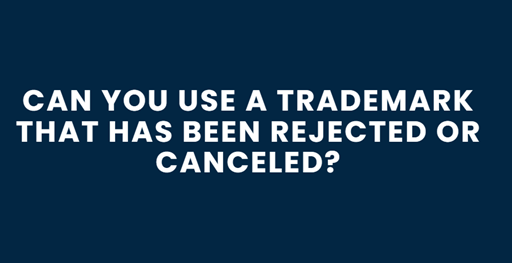Can You Use a Trademark That Has Been Rejected or Canceled?
Using a trademark that has been rejected or canceled can be possible, but it depends on the specific circumstances surrounding the rejection or cancellation. Here’s a detailed explanation of the factors to consider:

1. Using a Rejected Trademark
If a trademark application was rejected by the USPTO, it means the trademark was never officially registered. However, you may still be able to use it, but with caution:
Why Was It Rejected?
Likelihood of Confusion: If the rejection was due to similarity with an existing registered trademark, using it could lead to legal disputes or infringement claims.
Descriptiveness or Genericity: If the trademark was rejected because it was too descriptive or generic, it may not be protectable, but you can still use it (though it won’t have strong legal protection).
Other Issues: Rejections can also occur due to improper filing, lack of distinctiveness, or offensive content. Addressing these issues may allow you to reapply.
What Can You Do?
Modify the Trademark: If the rejection was due to similarity or descriptiveness, you can modify the trademark to make it more distinctive and reapply.
Conduct a Comprehensive Search: Ensure no other conflicting trademarks exist before using it.
Use It Unregistered: You can use the trademark without registration, but you won’t have the legal benefits of federal trademark protection.
2. Using a Canceled Trademark
A canceled trademark is one that was once registered but is no longer active. Using it may be possible, but you need to investigate why it was canceled and whether it’s still associated with the original owner.
Why Was It Canceled?
Non-Renewal: If the trademark was canceled because the owner failed to renew it, it may be available for use or registration by someone else.
Abandonment: If the trademark was canceled due to non-use, it may be free for others to use, but you must confirm that the original owner has truly abandoned it.
Legal Challenges: If the trademark was canceled due to a legal dispute (e.g., it was deemed generic or fraudulent), using it could lead to similar challenges.
What Can You Do?
Check for Residual Goodwill: If the canceled trademark still has brand recognition or goodwill associated with the original owner, using it could lead to consumer confusion or legal disputes.
Conduct a Trademark Search: Use the USPTO’s TESS system to ensure no one else has registered or is using the trademark.
Re-register the Trademark: If the trademark is available, you can apply to register it in your name. However, you must demonstrate a bona fide intent to use it in commerce.
3. Risks of Using a Rejected or Canceled Trademark
Infringement Claims: If the trademark is still associated with another party (even if unregistered), you could face legal action.
Consumer Confusion: Using a trademark that is similar to an existing one could mislead consumers and harm your brand’s reputation.
Lack of Protection: If the trademark is not registered, you won’t have the legal benefits of federal trademark protection, such as the ability to sue for infringement or nationwide exclusivity.
4. Steps to Take Before Using a Rejected or Canceled Trademark
Research the Trademark’s History: Use the USPTO’s TESS and TSDR systems to understand why it was rejected or canceled.
Conduct a Comprehensive Search: Ensure no conflicting trademarks exist in the marketplace.
Assess Market Perception: Determine if the trademark still carries residual goodwill or recognition.
Consult a Trademark Attorney: A legal professional can help you evaluate the risks and ensure compliance with trademark laws.
Using a rejected or canceled trademark can be possible, but it requires careful research and consideration of legal risks. If the trademark is truly free for use and does not conflict with existing rights, you may be able to use or re-register it. However, always consult a trademark attorney to avoid potential disputes or infringement claims.
